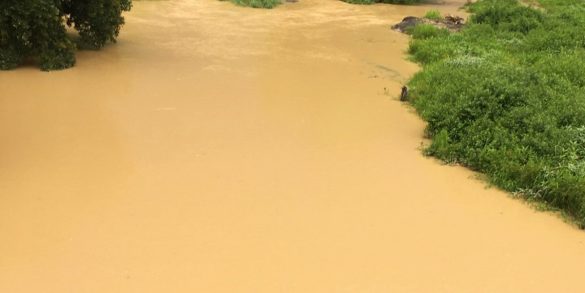The 2022 edition of the annual Osun-Osogbo festival commenced on Monday, 1st August 2022, with the traditional procession of the Osogbo Royal Council and Osun devotees called ‘Iwo popo’ and the grand finale is scheduled to hold on the 12th of August 2021.
The grand finale of the annual festival native to Osogbo will witness the carrying of a sacrificial calabash to the Osun-Osogbo groove at the Osun Riverbank by ‘Arugba’ (calabash bearer).
The Arugba carries the calabash on her head in the company of Osun devotees.
The groove was acknowledged as a world heritage site by UNESCO in 2005.
This year’s festival will occur without a solution to the pollution of the famous Osun River. The pollution was first noticed around 2018 and was confirmed to be a result of gold mining operations in the Ijesa part of the state. Environmental activists have since called on the government at all levels to find a solution to the polluted water.
Part of the efforts in this direction was the #SaveOsunRiver social media drive last year. Laboratory tests confirm that the water from the river is contaminated by heavy metals, including mercury and lead.
The pollution has also resulted in the discolouration of the water from its natural colourless characteristic to a muddy brown colour. Although the Osun State government inaugurated a Mineral Resources and Environmental Management Committee in April 2021, the effort of the 9-man committee headed by Omolade Binuyo, a Federal Mining Officer, remains to be seen as far as the Osun River pollution is concerned.
Polluted and decolourized Osun River
In an email exchange with Urban Alert, a non-governmental organisation that focuses on amplifying the voice of the masses and bringing the attention of relevant government officials and agencies to issues that are inimical to the development of society, they expressed their relentless effort to reach out to relevant stakeholders as far as the pollution of the Osun River is concerned.
Their message reads in part: “Urban Alert is unrelenting on the #SaveOsunRiver project, as we continue to reach out to all stakeholders locally and internationally. Presently, no significant step has been seen to have been taken by the Federal and Osun State Governments.
While we are hopeful that the government will see reasons to protect the lives of the traditionalists, tourists and residents of over 20 communities affected by the contamination, we are optimistic that more stakeholders will step in and engage the authorities in this life-threatening situation.”
Mining and minerals fall under part 1 of the second schedule (exclusive list) of the Nigerian constitution, which makes it an exclusive business of the federal government, and no commitment has been seen to have been shown by the government at the federal level since the outcry for the proper regulation of mining activities in the state began. Urban Alert, in a letter dated 1st July obtained by this reporter and addressed to the Director General of the National Environmental Standards and Regulations Enforcement Agency, intimated the DG of the danger posed by the river pollution to the environment and the populace.
In an interview with an Osun devotee, Sikirulahi Abiodun, he noted that at first, the pollution was thought to be a result of erosion and the water was expected to return to its original state, but when it persisted over time, it was then that the problem was identified to be as a result of mining.
“Despite the pollution Osun-Osogbo festival in the recent past years still attracted tourists from far and near, people still fetched water from the river for medicinal purposes, and people believed in the supernatural power of the Osun goddess to cure them of ailments. People fetch the water, and it has done no one any harm, so I don’t see anything changing during this year’s celebration,” he stressed.
According to the World Health Organisation, mercury and lead in the body affect multiple organs and are more dangerous to young children.
Mercury is particularly dangerous to foetal life. Hence, pregnant women are advised to avoid mercury exposure. They are distributed to delicate parts of the body, including the brain, liver, bone and kidney, with harmful effects. There is no level of exposure to lead that is not known to be harmful. Mercury is considered by WHO as one of the top ten chemicals of primary public health concern.
Do you have any information you wish to share with us? Do you want us to cover your event or programme? For Adverts or report call/WhatsApp us on +2348072633727









